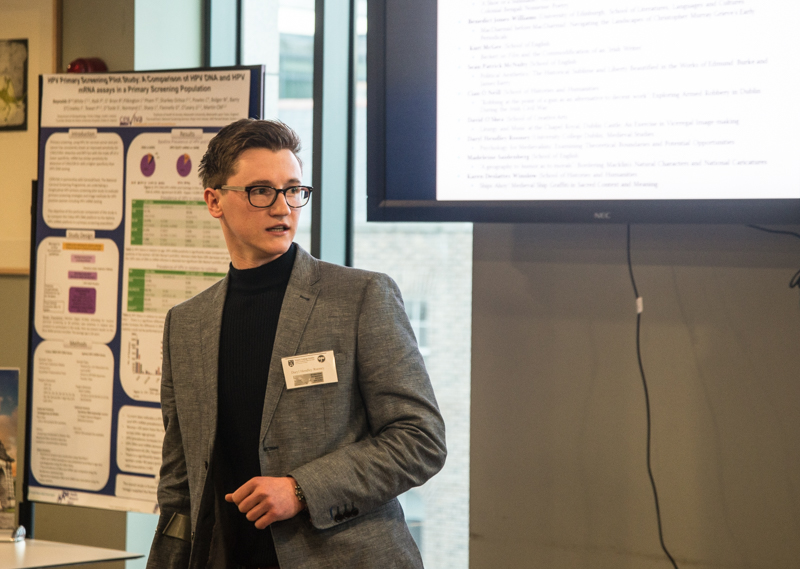
The 16th volume of Trinity’s Postgraduate Review launched last night in Trinity’s Biomedical Sciences Institute (TBSI), featuring the work of postgraduate students in Trinity, other Irish universities and the wider world.
The review, which is produced annually, launched as part of Trinity’s Graduate Students’ Union’s (GSU) inaugural International Postgraduate Research Conference, which has adopted the theme of “borders and horizons”, exploring the global nature of postgraduate research. Indeed, this year’s review featured the contributions of students from University College Dublin (UCD), Northwestern University in the US and the University of Edinburgh, as well as those from Trinity. The launch took place in the Knowledge Exchange, located in the TBSI.
This year’s review, edited by Laura McCloskey, features topics such as the bridge between the psychology and the Troubles and the sacred context and meaning of medieval ship graffiti.
Speaking at the launch, Chair of the review and President of the GSU, Shane Collins, commended the “immense” work of the editorial team. Speaking to The University Times, he highlighted the importance of the review’s “promotion of multidisciplinary research”. He added that he was “delighted” that Trinity’s Dean of Research, Prof John Boland, had supported the publication, and that they could work together to “support early career researchers”.
A number of the publication’s contributors spoke at the launch. Among them was Daryl Hendley Rooney of UCD’s MA in Medieval Studies, whose submission, “Psychology for Medievalists: Examining Theoretical Boundaries and Potential Opportunities”, examined the role of psychology in interpreting history. This approach, he stated, could be the “bridge between the medieval past and the modern present”. We take certain things for granted when examining the past, he claimed – even things as basic as how we respond to the weather.
Hendley Rooney encouraged those present to submit to the publication, not only for the experience of being published but to gain the “practical and useful experience” of dealing with the academic issues behind getting published. This sentiment was echoed by Cian Ó Néill of Trinity’s School of Histories and Humanities, whose submission, “‘Robbing at the point of a gun as an alternative to decent work: Exploring Armed Robbery in Dublin During the Irish Civil War”, looked at unrest in Dublin outside of the better-documented labour disputes. Unlike the rest of the country, Dublin had its own police force, and Ó Néill’s work examined how Dublin saw instances of crime, including an ice cream vendor held up at gunpoint, that he argued were, in some ways, more significant than these labour disputes.
Made up of an extensive peer review committee, this year’s review featured a forward from the Dean of Graduate Studies, Dr Neville Cox. Since he took up the role last year, the best part, he argued, has been “becoming acquainted with the extraordinary breadth and quality of research undertaken in the university on a daily basis”. Such publications, he stated, “are part of what our university should be about”.






